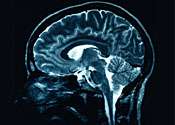Speeding up Huntington's research

(Medical Xpress) -- Human brain cells showing aspects of Huntington’s Disease have been developed, opening up new research pathways for treating the fatal disorder.
An international consortium, including scientists from the School of Biosciences, has taken cells from Huntington’s Disease patients and generated human brain cells that develop aspects of the disease in the laboratory. The cells and the new technology will speed up research into understanding the disease and also accelerate drug discovery programs aimed at treating this terminal, genetic disorder.
Huntington's Disease is an aggressive, neurodegenerative disorder which causes loss of co-ordination, psychiatric problems, dementia and death. Scientists have known the genetic cause of this disease for more than 20 years but research has been hampered by the lack of human brain cells with which to study the disease and screen for effective drugs.
The new breakthrough involves taking skin cells from patients with Huntington's disease. The scientific team reprogrammed these cells into stem cells which were then turned into the brain cells affected by the disorder. The brain cells demonstrate characteristics of the disease and will allow the consortium to investigate the mechanisms that cause the brain cells to die.
Dr. Nicholas Allen, one of the lead investigators at the School of Biosciences, said: "This breakthrough allows us to generate brain cells with many of the hallmarks of this disease, within just a few weeks. This means that we can study both the normal physiology of these brain cells, and the pathological processes that lead to their death."
The other Cardiff lead, Professor Paul Kemp, said: "Huntington’s Disease normally takes years to manifest in the human brain. Now we have a fast and reproducible model of this disease, offering fresh hope for the discovery of new therapies."
The corresponding author of the paper, Professor Clive Svendsen, a UK scientist and now director of the Cedars-Sinai Regenerative Medicine Institute in the USA, said "This Huntington's 'disease in a dish' will enable us for the first time to test therapies on human Huntington's disease neurons. In addition to increasing our understanding of this disorder and offering a new pathway to identifying treatments, this study is remarkable because of the extensive interactions between a large group of scientists focused on developing this model. It's a new way of doing trailblazing science."
Director of the School of Biosciences, Professor Ole Petersen said: "This is an extremely important development and I am delighted to see colleagues from the School of Biosciences playing their part in this distinguished international team. I look forward to seeing future stages, when this new technique is put to work modeling the diseases and testing potential treatments."
More information: www.cell.com/cell-stem-cell/ab … 1934-5909(12)00338-4












